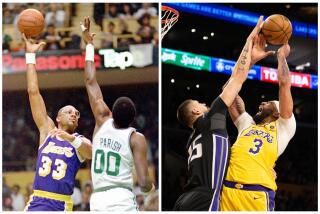Contacts Are Lens of Choice for Workouts, Competition : Lifestyles: A recent Gallup poll finds 81% of Americans with vision problems make the switch for any kind of athletic activities.
- Share via
For the “four-eyes” who like sports and exercise, the question is do you work out with glasses or switch to contact lenses?
A recent Gallup poll found that 81% of Americans who wear both glasses and contact lenses prefer contacts when competing or working out. “Contact lenses can help an athlete see better and play better,” said optometrist Donald Tieg of the Institute for Sports Vision in Ridgefield, Conn.
The advantage of contacts is that they don’t fog up during play. They also extend peripheral vision, giving a competitive edge over standard glasses whether an individual is playing football, jogging or doing aerobics.
“I really can’t think of any sports, except swimming or downhill skiing, where the condition might be somewhat adverse to wearing contact lenses,” said Frederick Brightbill, clinical professor of ophthalmology at the University of Wisconsin Medical School in Madison.
Contacts can, of course, occasionally get knocked out of the eye during play. But that is rare because of the increasing use of soft contact lenses, which stay in place better because they are larger and more pliable than the hard lenses--called rigid gas-permeable lenses. Today, roughly 85% to 90% of the contact lenses worn are soft.
“The gas-permeable lenses are about two-thirds the size of the cornea,” Brightbill said. “So they are more likely to be knocked off if the person wearing them is jarred or looks the wrong way during a blink.”
Hard or soft, contacts can provide some protection. The lenses distribute the impact of being hit in the eye across the surface and absorb some of the force, according to ophthalmologists.
But they can’t do much to protect the eye from severe blows. A fast-flying football or an elbow jab can cause the contact lens to skim across the cornea, producing a painful scratch. So contact-lens wearers need to take the same precautions as other athletes in donning protective eyewear appropriate to their particular sport.
In some cases, prescription goggles or other sports glasses may be the better choice. The speed of downhill skiing often dries out contacts and makes them uncomfortable to wear, Brightbill said. That’s why many skiers who need glasses switch to prescription goggles.
Swimming also can be tough on contact lenses. Hard lenses can easily be washed out in the pool. Both types of contact lenses can pick up bacteria--even in chlorinated pools--that may cause infection.
“If you wear contact lenses in the pool, remove and sterilize them after you get out,” said James V. Aquavella, clinical professor of ophthalmology at the University of Rochester School of Medicine and Dentistry.
But what about those who use extended-wear lenses--the kind that are not cleaned and sterilized but are worn for days and then discarded? “Don’t open your eyes while swimming under water,” Aquavella said. Also keep eyes shut in the shower, where soap, shampoo and bacteria from hair, eyelids and skin can wash into the eyes and lodge in the contact lenses, he said.
The best bet is for athletes who wear contact lenses to be prepared. “Have a spare lens case and spare contacts with you,” Aquavella said. “When in doubt, take them out.”
More to Read
Go beyond the scoreboard
Get the latest on L.A.'s teams in the daily Sports Report newsletter.
You may occasionally receive promotional content from the Los Angeles Times.









